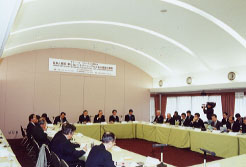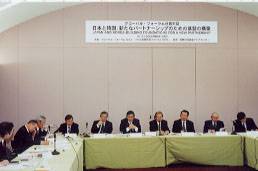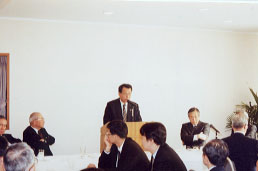International Dialogue
Summary of Dialogues
The First Japan-Korea Dialogue Convened "Japan and Korea: Building Foundations for a New Partnership"
The Global Forum of Japan (GFJ) and the Seoul Forum for International Relations (SFIA), with support from the Japan Foundation Asia Center, co-sponsored the first Japan-Korea Dialogue on the theme of "Japan and Korea: Building Foundations for a New Partnership" on December 10-11, 2000 in Tokyo. The dialogue began with a welcome dinner in the evening of the 10th and was followed by a full day of lively discussions in the morning, luncheon and afternoon sessions between the 57 participants from Japan and Korea at the International House of Japan. Participants lively exchanging views in the morning session |
A New Political Dialogue for a New Partnership
The morning session of the 11th was chaired by Prof. Ito Kenichi, Governor and Executive Director of GFJ. The theme of the session was "A New Political Dialogue for a New Partnership" and the keynote speech was given by Mr. Kim Jin-Hyun, chairman of "Munwha Ilbo" newspaper. Mr. Kim in his speech said, "I feel pity rather than anger about the recent distortions of history in Japan. A cooperative partnership between the Korean and Japanese people is not possible under such distortions. Since the close of the Cold War, Japan-Korea cooperation has progressed in fields such as finance, trade, manufacturing, tourism, sports and environmental preservation etc. However, to think that this kind of limited cooperation represents a historical shift in relations between the two peoples is a misconception. To build a truly voluntary partnership, a new understanding of history by Japan is a prerequisite."
In response to Mr. Kim's keynote speech the three Commentators put forward their opinions. Firstly Prof. Okonogi Masao of Keio University, said, "Having heard very stern words which we used to hear before the Kim Dae-Jung Government came to power, I believe that the increase in exchanges between the younger generation of Japanese and Koreans will come to change Japan-Korea relations." The next Commentator, Mr. Sohn Hal-Kyu, Member of the National Assembly, stated "In Japan's view of Korea there were aspects of colonialism and a sense of superiority. In the past, cooperation had been of a vertical form, with Korea feeling that it was the victim." The final Commentator, Prof. Inoguchi Takashi of Tokyo University, stated, "In Germany the elite people talk of issues about history but the masses remain silent. In Japan, the grass roots come up spontaneously to express their opinions and emotions." The Chairman of the session, Prof. Ito Kenichi, pointed out "There are a number of differences between the Japanese and German experience. One is the holocaust in Germany, and another is the atomic bombing in Japan. Also the fact that Japan resorted to war for different reasons against each of the Continent, the United States, Southeast Asia and Russia, while Germany waged a singularly motivated war."
 Cong. Hosoda Hiroyuki, giving the keynote speech in the afternoon session (front row, third from left) |
 Mr. Han Seung-Soo, former Korean Deputy Prime Minister, presenting the luncheon lecture |
Prospects for Japan-Korea Economic Cooperation
In the afternoon session, Prof. Kim Cae-One of Seoul National University, assumed the role of Chairman. The theme of the session was "Prospects for Japan-Korea Economic Cooperation" and Cong. Hosoda Hiroyuki gave the keynote speech. Cong. Hosoda stated, "When Korea was hit by the currency crisis, Japan pledged 20 billion dollars in financial aid (of which 5 billion dollars was actually provided). This was to be the spark that dramatically improved Japan-Korea relations. It would be no exaggeration to say that for the first time Japan was regarded as a friend by Korea. Although both Japan and Korea are harassed by the existing structural problems of their own economic systems, henceforth Japan-Korea cooperation should be promoted through measures such as deregulation, promotion of mutual investment and the signing of free trade agreements (FTA). In the future, the strengthening of exchanges, including those with China and the ASEAN countries, should be considered."In response to Cong. Hosoda's keynote speech the three Commentators put forward their responses. Firstly Mr. Ro Sung-Tae, Editor-in-Chief of The Korea Economic Daily, said, "There is concern on the part of Korea that free trade agreements could lead to the ruin of the Korean economy." Mr. Fujimura Masaya, Executive Advisor of Mitsubishi Materials Corporation, however, argued by saying, "In Korea, certainly there are voices of concern raised in especially the agricultural, forestry and marine industries. However, are not the fundamental rules nonetheless provided by WTO principles?" The final Commentator, Prof. Rhee Chang-Yong, Associate Professor of Seoul National University, responded by pointing out, "The most important thing is the fact that the promotion of economic exchanges between Japan and Korea would contribute to the improvement of Japan-Korea relations."
Additionally, at the luncheon session, Mr. Han Seung-Soo, former Deputy Prime Minister of Korea and current Member of the National Assembly, presented a lecture, in which he stated, "We should learn from the ideal and achievements of the integration of Europe and that even in Northeast Asia, Korea, Japan and China should have a long term hope of political and economic integration." The lecture left a deep impression on all present.
The Dialogue was reported by the articles in the December 12th edition of the Yomiuri Shimbun, in the December 12th and 18th editions of the Japan Times in Japan and by the article in the December 12th edition of Munwha Ilbo in Korea.
